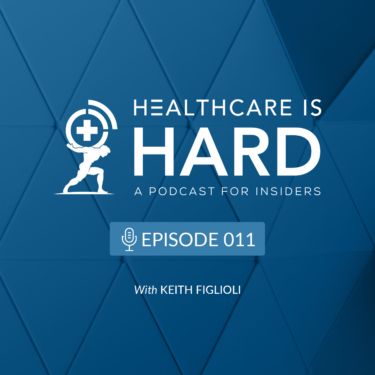Atrius Health is way ahead of the curve when it comes to risk-based reimbursement models. With 715 doctors providing care to approximately 745,000 patients, Atrius Health has quickly grown to become the largest independent physician group in the northeast. But what really makes Atrius Health unique is that nearly 80% of its revenue now derives from full-risk contracts in which the organization is accountable for the quality, experience and total cost of patient care.
With value-based care (VBC) at its core, Atrius Health focuses on prevention, population health management and creating full alignment with patients and patient care needs. In this episode of Healthcare Is Hard: A Podcast for Insiders, Keith Figlioli talks to Atrius Health CEO Dr. Steven Strongwater about the challenges of moving to risk-based reimbursement, the successes Atrius Health has seen thus far, and next steps in the organization’s journey. Topics they explore include:
- The value of partnerships. Being a health system that is not hospital-based provides Atrius Health with a number of advantages in the way it partners with other organizations to deliver the right care. For example, Atrius Health has partnerships with numerous hospitals that include interoperability of electronic medical records to ensure that patient hand-off is extremely tight and coordinated. Among other things, this ensures that there is no waste or frustration as a result of repetitive testing while ultimately lowering cost and improving care.
- Balancing the books with a high level of risk-based payments. One of the main difference in the financials of a value-based organization is that it requires significant reserves to balance the difficult years, according to Dr. Strongwater. For example, there are certain trend adjustments that an organization can make from year-to-year, but there can also be years where unexpected (and expensive) medical breakthroughs, such as new drugs, are introduced. Dr. Strongwater talks about the need for good contracts, decent reserves, and situational awareness – from both an actuarial and clinical perspective – in order to successfully navigate these occurrences.
- National trends between independent and owned practices. Independent physician practices are essential to the future of medicine and continue to drive transitions of change. Organizations such as Atrius Health are the ones working harder to avoid hospitalization and to always do what’s right for the patient and the total cost of care. In the process, they’re committed to addressing the country-wide epidemic of physician burnout and figuring out what’s doable for not just physicians, but nurses, nurse practitioners and others. They’re in a great position to do so because of an ecosystem that truly connects with patients – even in their home – and allows for experimentation. But as Dr. Strongwater points out, size matters and only large independent networks have the scale to experiment and the depth of resources to make changes.
- The driving source of change towards VBC. High-deductible health plans are deterring many Americans from going to a provider for care, but growing consumer pressure is what will ultimately push more organizations towards value-based arrangements, such as the one underway at Atrius Health. This offers the best of both worlds: helping a patient make good choices for their overall health – through preventative programs and otherwise – while driving down costs. Dr. Strongwater reiterates that value-based care isn’t about disrupting primary care, but that this model is one that should be implemented through life’s full continuum of care, from birth to death.
To hear Dr. Strongwater talk about these topics and more, listen to this episode of Healthcare is Hard: A Podcast for Insiders.
